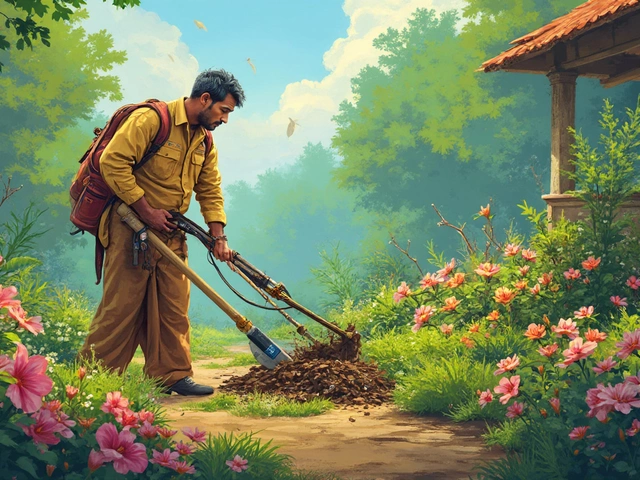If you've ever found yourself curious about what makes landscapers tick, you're not alone. Many wonder how this profession not only brings beauty to our surroundings but also pays the bills. Well, let's get right into it—landscaping is more than just planting a few trees; it's a profession with real earning potential. But what's the secret to hitting those top salaries?
First off, it's essential to understand that not all landscaping jobs are created equal. Roles can vary widely, from entry-level tasks like mowing lawns to more specialized positions involving intricate landscape design. Naturally, these variations impact how much you can earn.
Now, where you live plays a massive role in your paycheck, too. Some regions offer higher wages due to demand, cost of living, or even seasonal work surges. So, if you're keen to rake in the top bucks, understanding these market dynamics is key.
- Understanding Landscaper Roles
- Factors Affecting Pay
- Top Paying Regions
- Skills That Boost Earnings
- Tips for Career Advancement
- The Future of Landscaping Jobs
Understanding Landscaper Roles
When you dive into the world of landscaping, it’s like opening a book with a new story on every page. From the outside, it might look like all landscapers do the same job, but that's far from the truth. Let’s break it down.
General Laborer
First up, we have the general laborers. These are the folks you see doing the grunt work, like mowing lawns and trimming hedges. While it might not sound glamorous, it's a crucial part of keeping any yard in top shape. Entry-level gigs can start at a humble rate, but they offer a great foundation for those new to the field.
Gardeners
Gardeners take things a step further. They not only care for existing plants but often make decisions about plant health, soil quality, and even planting designs. They’ve got a good eye for which plants will thrive in specific conditions. The pay is typically a notch above your basic labor gigs, reflecting the added expertise required.
Landscape Designers
Now, let’s step into the shoes of a landscape design professional. These are the real visionaries. They plan comprehensive garden layouts and often work with clients to bring grand ideas to life. They’ll consider everything from aesthetics to functionality. If you’re eyeing top dollar, specializing in landscape design can definitely put you on that path.
Hardscapers
Let’s not forget the hardscapers—these pros handle non-plant elements like patios, decks, and pathways. It’s a skill that blends creativity with practicality and usually pays well because it requires a blend of craftsmanship and design.
The best part? There’s crossover among these roles, which means you can continually learn and expand your resume. More skills often translate to more money. What’s clear is that landscaping jobs aren’t one-size-fits-all; they’re as varied as the landscapes themselves.
Factors Affecting Pay
When it comes to landscaper salary, there's no one-size-fits-all answer. Several factors can make a difference in what you take home at the end of the day. Let's break down what these factors are and how they can impact your paycheck.
Skills and Experience
The level of skill and experience you bring to the table is a big one. Just like any other job, the more experienced you are, the higher your earning potential. Skilled landscape designers with a portfolio to showcase often earn more than those just starting out. Employers are willing to pay a premium for those who can bring creativity and efficiency to a project.
Certifications and Specializations
Having certifications or specializations can set you apart in the landscaping jobs market. Courses in horticulture, project management, or landscape architecture could be your ticket to better-paying opportunities. Some certifications prove your expertise and can lead to better jobs or even management positions within a company.
Geographic Location
Where you work in the world significantly impacts your landscaper salary. For example, landscapers in areas with higher living costs generally make more. Additionally, regions with growing housing markets often have higher demand for landscapers, pushing up wages. Consider this aspect when planning your career path.
Employer Type
Who signs your paycheck also affects how much you're likely to earn. Those employed by large corporations or government bodies usually enjoy better pay and benefits compared to those working for small private firms. Working for a company that values employee development can also offer more opportunities for raises and bonuses.
Seasonal Demand
Another factor that can affect your pay is the seasonality of landscaping work. Peak seasons might offer more work and higher pay due to increased demand. However, offseason periods could mean fewer hours or less pay. Some landscapers tackle this by finding supplementary work during the slower months.
A good strategy is to stay informed and flexible to adapt to the fluctuations in the market, ensuring you know where the high-paying landscaping jobs are and what skills are in demand.
Top Paying Regions
When it comes to finding top pay in the world of landscaping jobs, where you live can make all the difference. Certain regions across the globe offer landscapers a chance to earn a handsome salary, often due to factors like high demand, cost of living, and market conditions.
The United States
In the United States, states like California, New York, and Massachusetts top the list of high-paying regions for landscapers. It's no surprise, given the cost of living and high demand for beautifully manicured properties in urban areas. California, for example, is a hotspot for landscape design with its sprawling estates and continuous growth in residential areas.
Interestingly, according to the Bureau of Labor Statistics, landscapers in California can earn an average of $20 per hour, with top earners reaching over $30 per hour. However, it's worth noting the cost of living is also significantly higher in these areas.
New Zealand
Down here in New Zealand, Auckland leads the pack with competitive wages for those in the landscaping services industry. The city's booming real estate market fuels a constant demand for landscaping and gardening projects.
Australia
Australia also offers lucrative opportunities, particularly in cities like Sydney and Melbourne. The high real estate prices drive homeowners to invest in aesthetically pleasing outdoor spaces, ensuring steady work for skilled landscapers.
Understanding the Market
So, what does this mean for you? If you're considering relocating or just starting in the field, targeting these high-paying regions could be a savvy move. Of course, weigh the benefits against the cost of living expenses. It's all about balancing where you want to live with potential earnings and expenses.
The bottom line is that knowing where the top pay for landscapers is can provide some insight as you navigate your career. It pays (literally) to be informed about global trends and regional differences in pay rates.

Skills That Boost Earnings
So, what sets the top earners in the landscaping jobs sphere apart from the rest? Well, it's all about the skills that you bring to the table. To climb up the pay scale, there's more to it than just being able to mow the lawn straight. Let's get into some specific skills that can really beef up your paycheck.
Mastering Landscape Design
Diving deep into landscape design is where the magic happens. Those with a flair for creating beautiful, practical outdoor spaces not only get to unleash their creativity but also command higher fees. Having an eye for design coupled with the technical know-how to bring visions to life can significantly raise your stock. Learning to use tools like AutoCAD or SketchUp for design planning doesn’t hurt either.
Botanical Knowledge
Understanding plants—what thrives where, what to plant when—is crucial. Top-tier landscapers have a solid grasp on local flora and the patience to suss out the right plant combinations. It’s not just about aesthetics; knowing which plants complement each other and the environment can save clients time and money, making their services invaluable.
Irrigation and Water Management
Water can be a landscaper's best friend or worst enemy. Being proficient in irrigation systems and water management techniques is a huge plus. Setting up efficient watering systems that conserve water while keeping the landscape lush and thriving can significantly enhance your service offering.
Equipment Handling
Let’s face it, landscaping involves a lot of gear. Being adept at operating different machines and maintaining them can mean the difference between a job that impresses and one that just scrapes by. The more equipment you’re skilled with, from mowers to diggers, the more versatile and valuable you become.
Project Management
Handling large-scale projects involves more than just physical labor. Skills in project management, such as organizing teams, managing time, and communicating effectively with clients, can elevate you from a doer to a leader. This not only increases your worth but also opens doors to higher managerial roles.
Customer Relationship Management
Finally, being able to effectively interact with clients is pivotal. Building a trusting, communicative relationship not only helps retain customers but often results in referrals, which means more business and potentially more money in your pocket.
Ultimately, those gunning for the top salaries in landscaper salary brackets need to see continuous skill development as a key investment. Keep pushing yourself to learn and adapt, and your earnings will likely match your growing expertise.
Tips for Career Advancement
So, you're keen on climbing the ladder in the landscaping world? Great choice, because this industry offers more growth opportunities than many realize. To jump to the top, though, you'll need more than just a green thumb.
Get Certified
One surefire way to boost your profile is by getting certified. Organizations like the National Association of Landscape Professionals (NALP) offer credentials that can set you apart. Certified professionals often earn more, as clients and employers see them as authorities in the field.
Expand Your Skill Set
Diversify your abilities by learning new techniques in landscape design, plant care, or even eco-friendly practices. Practical skills, like operating advanced machinery, can elevate your role and landscaper salary significantly.
Network Effectively
Networking isn't just for techies and executives; it’s vital here too. Attend industry conferences, join local gardening clubs, and connect with peers on platforms like LinkedIn. A solid network might lead to job offers you won't find on traditional job boards.
According to a recent report by Landscaping Magazine, "80% of top-tier landscaping jobs are filled through personal recommendations and industry connections."
Embrace Technology
Technology in landscaping? You bet. From landscape management software to drone surveying, being tech-savvy gives you a competitive edge. Staying updated with tech trends not only enhances your job efficiency but also makes you an asset in modern landscaping teams.
Seek Mentorship
Finding a mentor in your area could provide insights that books and courses don't offer. A mentor can guide you through career decisions and challenge your growth limits.
Remember, whether it’s learning new skills or forging key connections, consistency is key. The landscaping industry is as much about passion as it is about strategic career moves.
The Future of Landscaping Jobs
Thinking about the future of landscaping? It's a field that's changing, and that's good news if you're in the industry or looking to jump in. This shift means more opportunities to land that top pay for landscapers.
Technology in Landscaping
Gone are the days when landscaping was all manual labor. Automation and new tech are now part of the scene. Drones for mapping out landscapes and advanced irrigation systems are some of the innovations making waves. If you can get comfortable with tech, you'll likely see a boost in your landscaper salary as you'll be more in demand.
Eco-Friendly Focus
There's a growing trend toward sustainable and eco-friendly landscaping. Clients want greener lawns and gardens with lower water use. Understanding environmental impacts can set you apart and add value to clients, possibly increasing your earnings.
High-Demand Skills
Specialized skills, like landscape design, are highly sought after. Courses and certifications in areas like horticulture or landscape architecture can turn you into a sought-after professional. That means better jobs and better pay.
Industry Growth
Predictably, the landscaping industry is expected to grow in the coming years. This growth is fueled by both residential and commercial needs. More people want beautiful outdoor spaces, whether at home or in the office. But what does this mean for jobs? Simply put, more opportunities to earn and diversify.
But don't just take my word for it. Here's a quick look:
| Year | Projected Growth % |
|---|---|
| 2025 | 5% |
| 2030 | 6% |
So, if you're looking to boost your earnings, keeping an eye on these trends and adapting to them can really pay off. With the right skills and attitude, those top-tier landscaping jobs are well within reach.


Write a comment